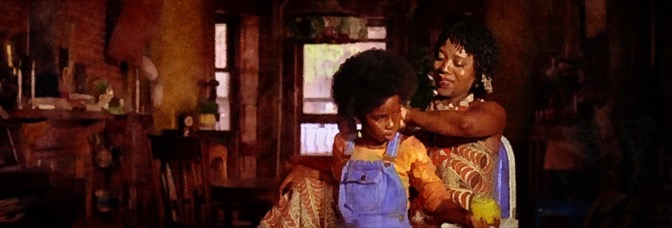Crooklyn is a series of memories. They’re mostly the main character’s memories—and if they’re not, they’re definitely from her perception. The memories start in the spring and go through the summer. Director Lee and his cowriters—and siblings (Crooklyn is semi-autobiographical) Joie Lee and Cinqué Lee frequently change the pace of the memories. Some are long scenes with a lot of action, some are shorter transitional scenes, memorable for their placement in the narrative and their location. The Lee siblings are very comfortable with the film’s narrative distance and changing it; they nimbly move between characters during the first half or so then turn around and slow down to focus on the protagonist. When they speed up again, there’s still the same tighter focus, but a lot more going on and at a different pace.
Zelda Harris is the protagonist. She’s nine years old; the only daughter of schoolteacher Alfre Woodward and successful working musician but not successful composer Delroy Lindo. She has four brothers. Carlton Williams plays the oldest, presumably Spike. He’s a jerk. He also gets the most material to do because he’s the oldest and he and Harris have a whole character arc going on through the movie but it’s one of the quietest subplots, because there’s not much room for laughs. Because Crooklyn has a lot of laughs. Woodward’s intense and the kids are stinkers. And Lindo not really being any help is one of the louder subplots. The masculinity isn’t terribly toxic, but it’s far from good. It leads to some big fights and tense discussions between Woodward and Lindo, which feature some phenomenal acting from the pair. Harris usually gets involved too, since her brothers are too busy being boys. The brothers being boys often contributes to a lot of the humor, which the script never uses to alleviate the drama. The two can coexist, but ones not a solution for the other.
As the film goes on—it starts towards the end of a school year, with Harris dreading the possibility of leaving Brooklyn to visit Southern relations over the summer. There are no scenes at the school. The film either takes place on the block, in the house, or down South. Until the third act, anyway. Third act is a completely different—appropriately—story for locations. But as the film goes on, the Lees take their time establishing the ground situation, establishing the characters, establishing the relationships. Exposition dumps are rare, usually only when they need to give context for an earlier detail, usually from Woodward, who is very fallible, she’s just not fallible about dumb things. She’s never sainted in the film, but she’s closer than anyone else to being a saint. The script doesn’t shy away from children’s cruelty or stupidity (not even Harris’s). It also is very careful in how it portrays Lindo, who takes the longest to get established. It’s a great script.
When summer finally arrives—in the second half of the film—and Harris goes down South to visit aunt and uncle Frances Foster and Norman Matlock and, more, cousin Patriece Nelson, Harris gets to really run the movie for a while. She gets to experience the strangeness of her relations and the South, but not to be aware of how that experience is going to perturb her character development.
Because she’s nine.
When the summer vacation is over, there’s a different Harris, but there’s also a very different situation waiting for her back at home. The script changes the pacing of the memories. Some events get missed, some events have more weight, and we’re watching Harris exist through them and experience them but have no idea what’s happening to her. Crooklyn isn’t a kids movie per se… but it’s also not not a kids movie. The film’s always from a kid’s eye-level, let’s say, and then it turns out that eye-level just perfectly matches Harris’s. It’s a really great script.
Performances—Harris, Woodward, and Lindo are the whole show. There are some really good supporting performances (Isaiah Washington’s performance as a Vietnam vet deserves its own movie). But it’s all about Harris, Woodward, and Lindo. As for whether Harris has better scenes with Woodward or Lindo on her own… it’s probably Lindo, just because how the character development arc goes. But there are still some fabulous ones between Woodward and Harris. Harris knows Lindo’s not exactly the most responsible adult. So lots of gristle for scenes.
Technically, Crooklyn’s near flawless. Great photography from Arthur Jafa, even better editing from Barry Alexander Brown, which is made even more effective thanks to the awesome Terrence Blanchard score. Wynn Thomas’s production design is awesome too. Especially when Harris goes down South and Lee stretches the screen to show it as otherworldly (distorted and televised). The production design is almost more important during that section, since the audience has to see and understand what Harris is seeing because she might not really understand it.
The stretching is director Lee’s most extreme style choice. He’s got a dream sequence, which fits into the film’s existing stylistic flourishes—Spike Lee appears a neighborhood glue-sniffer and jerk, so he gives himself most of the flash. It fits, given how his stand-in, Williams, treats Harris. Meanwhile, Joie Lee–Harris being her stand-in—shows up as a slightly overbearing aunt. Uncredited. Third screenwriter Cinqué Lee doesn’t cameo.
I haven’t even gotten to the soundtrack, which maybe was produced by Alex Steyermark. The use of seventies songs is exquisite, both in the narrative—as a detail—or as non-diegetic accompaniment of the scenes. It’s awesome.
Crookyln’s awesome. Harris, Woodward, Linda, and Lees Spike, Joie, and Cinqué make something special.

Leave a Reply